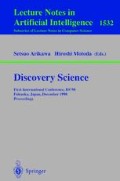Abstract
We or computers cannot have perfect knowledge about real events. Even in a very simple case, it is very difficult to have knowledge including every event which may have caused observed events. This makes it difficult to have the computer infer significant causes of observed events. However, the computer inference may supply good hints for humans, because unexpected relations detected between known factors by a computer suggest unknown events to humans, being combined with the vast human knowledge acquired by rich experience. In this paper, we aim at making the computer express “unknown” hidden causes, occurring at the observed time but not included in the given knowledge. This is for discovering temporary events, not acquiring permanent knowledge which generalizes observed data. Our method is to have the computer infer known causes of time-series of observed events, for detecting unexpectedly strong co-occurrences among known events. Then the detected relations are expressed to humans, which make significant unknown causal events easily understood. The Cost-based Cooperation of Multi-Abducers (CCMA), which we employ for the inference of causes, contributes for our purpose of discovery because CCMA can infer well about non-modelable time-series involving unknown causes
Access this chapter
Tax calculation will be finalised at checkout
Purchases are for personal use only
Preview
Unable to display preview. Download preview PDF.
References
Hanson, N.R., Patterns of Discovery, Cambridge University Press (1958)
Fayyad, U., Shapiro, G.P. and Smyth, P., From Data Mining to Knowledge Discovery in Databases, AI magazine, Vol.17, No.3, 37–54 (1996)
Langley, P., Simon, H.A., Bradshaw, G.L., and Zytkow, J.M., Scientific Discovery-Computational Explorations of the Creative Processes, MIT Press (1992)
Sunayama, W., Ohsawa, Y. and Yachida, M., Validating Questionnaire Data Analysis Systems by Shrinking Iterative Questionnaires, Workshop Notes on Validation, Verification and Refinement of AI, IJCAI’97 (1997)
Glymour, C., Available Technology for Discovering Causal Models, Building Bayes Nets, and Selecting Predictors, The TETRAD 2 Program, Proc. KDD’95, 130–135 (1995)
Ohsawa, Y. and Yachida, M., An Index Navigator for Understanding and Expressing User’s Coherent Interest, Proc. IJCAI’97, 722–729 (1997)
Binder, J., Murphy, K. and Russel, S., Space-efficient inference in dynamic probabilistic networks, Proc. IJCAI’97, 1292–1296(1997)
Charniak, E. and Shimony, S.E.: Probabilistic Semantics for Cost Based Abduction, Proc. AAAI’90, 106–111 (1990)
Poole, D: Probabilistic Horn Abduction and Bayesian Networks, Artificial Intelligence, 81–130 (1993)
Carver, N., Lesser, V., The DRESUN Tested for Research in FA/C Distributed Situation Assessment, Proc. Int’l Conf. Multiagent Systems, 33–40 (1995)
Ng, H. and Mooney, R., On the Role of Coherence in Abductive Explanation, Proc. AAAI’90, 337–342 (1990)
Koester, J., Voltage-Gated channels and the Generation of the Action Potential, Principles of Neural Science, 2nded. (Kandel, E.R. et al eds.), Elsevier, Part 2, 75–86 (1985)
Author information
Authors and Affiliations
Editor information
Editors and Affiliations
Rights and permissions
Copyright information
© 1998 Springer-Verlag Berlin Heidelberg
About this paper
Cite this paper
Ohsawa, Y., Yachida, M. (1998). Discovery of Unknown Causes from Unexpected Co-occurrence of Inferred Known Causes. In: Arikawa, S., Motoda, H. (eds) Discovey Science. DS 1998. Lecture Notes in Computer Science(), vol 1532. Springer, Berlin, Heidelberg. https://doi.org/10.1007/3-540-49292-5_16
Download citation
DOI: https://doi.org/10.1007/3-540-49292-5_16
Published:
Publisher Name: Springer, Berlin, Heidelberg
Print ISBN: 978-3-540-65390-5
Online ISBN: 978-3-540-49292-4
eBook Packages: Springer Book Archive

